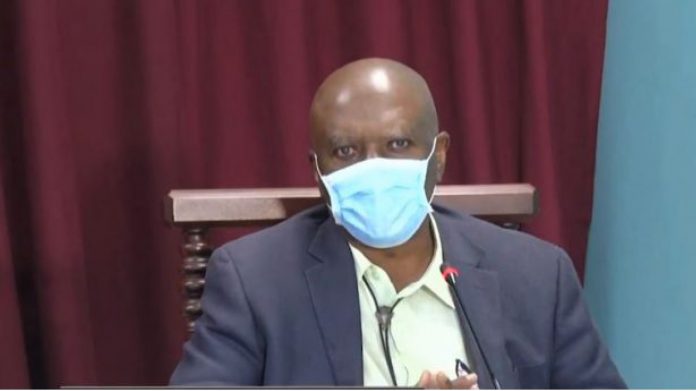By Orville Williams
“The less protected you are is the more you’re giving the ‘okay’ to Covid and its band of variants to be formed,” warned Dr Lester Simon, Chief Pathologist and head of the testing lab at the Sir Lester Bird Mount St John’s Medical Centre.
Following Tuesday’s disclosure that two new Covid-19 variants – Alpha and Beta – had been detected in Antigua and Barbuda, health officials stressed the importance of practicing safety measures – most importantly, getting fully vaccinated.
“The vaccines that are here and the vaccines that are coming, they work relatively good against the variants when you have the full vaccination – both doses in the case of AstraZeneca – but they do not work as well when you have just the one shot.
“If you have one shot and you think that you are protected, yes you are protected to some extent, but you have better protection if it was the wild type [the original virus that contains no major mutations].
“Not knowing whether it’s the wild type or variant that you have, you’re not going to have as much protection unless you get that second shot of the vaccine. This is true for all the vaccines that are out there, whether it’s Pfizer or AstraZeneca,” Dr Simon explained.
According to reports, the AstraZeneca vaccine provides approximately 50 percent protection against the Alpha variant after one dose and 65-90 percent protection against the same variant after two doses.
For the Beta variant, the manufacturer is currently carrying out trials for a ‘modified vaccine’, specifically designed to counter its effects.
So far, over 36,000 first doses of the AstraZeneca vaccine have been administered through the public vaccination programme in Antigua and Barbuda, along with close to 30,000 second doses. The latter figure is a drastic improvement from a few weeks ago, when the second dose figures paled in comparison to those for the first dose.
The increase in second dose inoculations is certainly very timely, as the risk of infection from Covid-19 or any of its variants could increase over the next few weeks and months.
Cruise ships are set to return to St John’s later this month, while stayover visitor numbers have been steadily increasing and are expected to continue going up through the summer. These visitors include persons from some of the major source markets in North America and Europe, where the new variants are accounting for thousands of new infections.
That reality, coupled with the fact the government has not placed any vaccination restrictions on persons entering the country, means infections could rise in Antigua and Barbuda during the aforementioned period.
Considering these developments, there has perhaps never been a more important time for residents in the country to get fully vaccinated.
The message to take the vaccine is not just geared at people who want to avoid getting infected, but, as Dr Simon added, it’s also for those who have recovered from the virus.
“After you’ve tested positive for Covid, you still need to get vaccinated. If you had symptoms and you were hospitalised, then once you return to a clinically normal status you need to have the vaccination done.
“Because you might, in fact, have been affected by a variant, or you may have a situation where your response to the virus may not in fact have been as good as it ought to be, this is why the vaccine is of absolute importance,” he said.
According to the Health Ministry, the Alpha variant of concern – first identified in the UK – was found in 13 positive samples taken in Antigua and Barbuda between February 14 and May 6, while the Beta variant of concern – first identified in South Africa – was found in two samples taken in Antigua and Barbuda between April 20 and 24.

